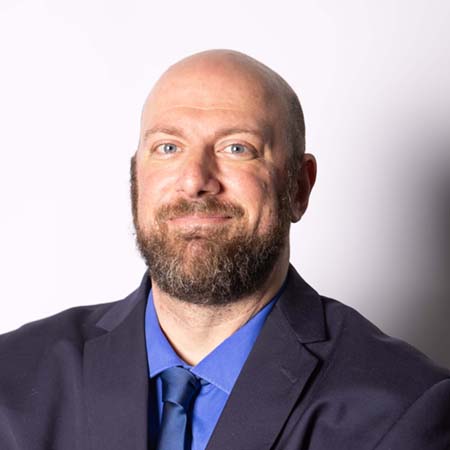UAB’s Civitan International Research Center (CIRC) is a world leader in research and treatment of intellectual and developmental disabilities. With more than 100 scientists, clinicians, and research staff from around the globe, the center is united by a single mission: improving the well-being and quality of life of individuals and families affected by neurodevelopmental disorders.
To highlight the groundbreaking work of its researchers, CIRC is launching a new spotlight series titled “Meet a Civitan Scientist,” which showcases the impactful research being conducted by individual scientists and their contributions to understanding and addressing neurodevelopmental challenges.
In this first installment, Matt Alexander, Ph.D., associate professor in the Division of Pediatric Neurology, explores his research on rare neuromuscular disorders in children and the potential it holds for advancing treatments.
Advancing research through personal motivation and scientific collaboration
The Alexander Lab works on understanding and treating rare childhood muscle-and-nerve disorders by building disease models, testing possible treatments, and finding biological signs that can help in clinical research.
In recent studies, the Alexander Lab, in collaboration with the lab of Karen Gamble, Ph.D., professor in the Department of Psychiatry and Behavioral Neurobiology, has been focused on identifying how the brain, specifically circadian rhythms, impacts skeletal muscle disease symptoms in Duchenne muscular dystrophy.
Alexander, who’s late uncle suffered from a rare neuromuscular disorder formerly called inclusion body myositis (now called GNE myopathy), was always fascinated with how the brain and nervous system regulate muscle movement and growth. “These factors have motivated me to learn more about how I want to tackle these rare genetic disorders, as they are often overlooked by the medical and pharmaceutical fields.”
In addition to his research, Alexander also sees patients in the Muscular Dystrophy Association Clinic at Children’s of Alabama, where he works to confirm genetic diagnoses, enroll patients in clinical trials, and share exciting developments and emerging treatments.
CIRC’s impact on research and training
Civitan has played a key role in supporting this work. “Civitan has been generous in both supporting my trainees—Dr. Muthukumar Karupassamy in my lab recently received funding to study a new mouse model of a rare NMD called XMEA, for which we are repurposing a promising drug candidate—as well as providing my lab with key equipment resources for performing critical experimentations in zebrafish and mouse models of muscle disease,” Alexander said.
He also served as president of the UAB Civitan Club in 2018 and frequently hosts Civitan members and students in his lab.
“I always enjoy meeting with and speaking to the Civitan members about how important our research in treating kids with neuromuscular diseases is. Often, many of them know community members or classmates that have these conditions, and I appreciate being able to discuss with them the challenges of daily living for children affected by these neuromuscular diseases.”
Looking ahead, Alexander is especially excited about an upcoming personalized clinical trial for XMEA, in collaboration with Michael Lopez, M.D., assistant professor in the Division of Pediatric Neurology.
“There are only around 30 cases worldwide, and two of those patients are seen at our clinic in Alabama,” he explained. “The data from our mouse study and this clinical trial—pending FDA approval— can have an impact for treatment for XMEA and similar neuromuscular disorders worldwide.”
Civitan International Research Center
•
July 29, 2025